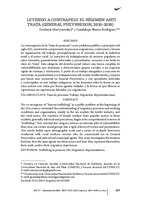Leyendo a contrapelo el régimen anti trata (General Pueyrredon, 2010-2018)
Date
2020-12-01Author
Martynowskyj, Estefanía
Blanco Rodríguez, Guadalupe
Metadata
Show full item recordAbstract
La reemergencia de la “trata de personas” como problema público a principios del siglo XXI, reorientó la comprensión de procesos migratorios, condiciones y formas de organización del trabajo, principalmente en el mercado sexual, la industria textil y el sector rural. La inserción de trabajadoras/es de sectores populares en estos mercados, generalmente informales y precarizados, comenzó a ser leída en clave de “trata”. Esta categoría del derecho penal reduce una trama compleja de vulnerabilidades que atraviesan a determinados grupos sociales, a un esquema rígido de víctimas y victimarios. A partir de un trabajo etnográfico y una serie de entrevistas en profundidad con trabajadores/as del cordón frutihortícola y mujeres que hacen sexo comercial en General Pueyrredon, y con operadores judiciales y municipales, en este trabajo indagamos en las tensiones entre la forma en que estos actores son vistos por los/as agentes estatales y la forma en que ellos/as se representan sus experiencias laborales y/o migratorias. The re-emergence of “human trafficking” as a public problem at the beginning of the 21st century reoriented the understanding of migratory processes and working conditions and organization, mainly in the sex market, the textile industry, and the rural sector. The insertion of female workers from popular sectors in these markets, generally informal and precarious, began to be comprehended in terms of “trafficking.” This criminal law category reduces an intricate plot of vulnerabilities that cross-cut certain social groups into a rigid scheme of victims and perpetrators. This article builds upon ethnographic work and a series of in-depth interviews conducted with rural workers, women who do commercial sex in General Pueyrredon, and judicial and municipal agents. This essay investigates the tensions between how the state agents see these actors and how they represent themselves, their work, and/or their migratory experiences.
Collections
- Revista Avá [337]
The following license files are associated with this item:



